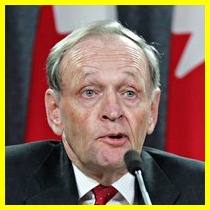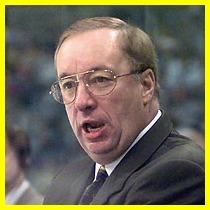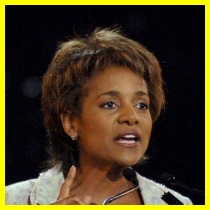The word 'democracy' in most cases tends to be a political ideal more than a political reality. the basic concept of democracy is something that, at best, you could say exists in varying degrees from country to country and from circumstance to circumstance. The USA, for example, is a country that elects local fire chiefs and school board trustees and yet once had Gerald Ford, a man unelected to any position whatsoever, serve as its president, to say nothing of the fiasco in 2000 when it seemed as if American democracy had failed entirely.
It hadn't; it was just suffering one of the spasms an improperly-designed system can fall victim to. The USA's northern neighbour Canada is a democracy, as much as any other country is, but from time to time its woefully incompetently-designed system can make it appear as despotic as any third-world country. Here are ten examples of moments in Canadian history that have been less than a shining beacon of democracy.
| 1. | GATINEAU IN 2008: To the victor go the spoils in the Canadian system. With a Westminster-based 'First-Past-the-Post' system, in Canada in any particular riding the one candidate who gets the most votes wins. In a strict two-party system, that would mean that a person always required the support of a majority of electors to be elected. When there are more than two parties, though, the number required for victory can drop well below 50%. As a recent example, the normally federalist riding of Gatineau in Québec sent a Bloc Québécois MP to Ottawa (just across the river) in 2008, one who was elected with 29.13% of the vote. It happened because of a rough four-way split in the riding, with each of the Bloc, the NDP and the Liberals polling more than 25% and the Conservatives also nearing 17%. In the end, while over 70% of the electorate cast their vote for federalist parties, a Bloc candidate was elected. |  |
|
| 2. | THE PROGRESSIVE CONSERVATIVES IN 1993: The 1993 election was a massive game-changer in Canada, one of those few occassions where an election really did change things. Kim Campbell's party was decisively rejected, going from 43% of the popular vote in 1988 to 16%, little more than a third. Yet 16% is still 2.2 million votes, considerably more than the 1.8 million the Bloc Québécois got. But the Bloc's votes were enough to get them 54 seats and the position of Official Opposition, while the PCs' votes got them a mere two seats and a loss of official party status. While this shows the advantage in the Canadian system of strong localised support vs. weak nationwide support, it's hard to argue that 54 seats for 1.8 million votes to 2 seats for 2.2 million votes is democratic. |  |
|
| 3. | SASKATCHEWAN IN 1934: This kind of imbalance, and the multiparty system that reveals it, is nothing new. For electoral weirdness, look back to 1934 and the always-interesting province of Saskatchewan. Immediately prior to taking the name "CCF", Major James Coldwell's "Farmer-Labour Group" contested the elction as the main voice of the left. The election resulted in 48.0% for the Liberals, 26.8% for the Conservatives, and 24.0% for the proto-proto-NDP. Nothing out of the ordinary even by modern standards perhaps (though in current-day Saskatchewan the Liberal Party barely exists and the Conservatives call themselves the Saskatchewan Party), but voting percentages tell little: of a 55-seat parliament, the Liberals returned 50 MLAs. The remaining five seats all went to third-place-finishing FLG. The Conservatives, meanwhile, finished second in popular vote but sent not a single person to Regina. Since the Conservatives ran on an anti-Catholic platform with Ku Klux Klan support, one need shed no tears, frankly, but you can't call it democratic. |  |
|
| 4. | NEW BRUNSWICK IN 1987: This is one of those examples that truly beggars belief. As lamentable as regionalism may seem, it is in fact one thing that keeps parliament accountable in a first-past-the-post system. Otherwise, if the entire country supports a particular party in more or less equal amounts, what happens? In New Brunswick in 1987, with the governing PCs tainted by scandal and the third-party NDP unable to present itself as a viable alternative, Frank McKenna's Liberals took 60% of the vote and won every single seat in the 58-seat legislature, running parliament for three years with no opposition whatsoever. While 60% is a resounding victory, though, one feels compelled to mention it means a not-insignificant 40% voted for other parties, parties that were completely shut out of parliament. |  |
|
| 5. | THE PRETEND MAJORITY: The problem of plurality victories in a 'First-Past-the-Post' system becomes magnified when applied nation-wide. Despite current trends, governments in Canada do tend to be majorities. Yet if a majority mandate ought to mean 'has the support of more than half of all Canadians', then Canada fares poorly. Since 1958, over half a century, there has been precisely one election in which a majority of voting Canadians cast their vote for the same party. That was in 1984, and Brian Mulroney's Progressive Conservatives managed - are you ready for it? - 50.03% of the vote. Chrétien's Liberals, meanwhile, were able in 1997 to eke out a majority with 38.46% of the nationwide vote - just five percentage points more than a mere third of the populace. |  |
|
| 6. | GENDER (IM)BALANCE: That Canada has no quota system in our electoral policy could be seen as an example of how it truly is democratic. Yet our current parliament is 22% female, 78% male. This overwhelming male dominance ranks us 48th in the world for gender representation in government: hardly a stat to be proud of. Canada has also never elected a female prime minister nor elected a female premier in any province larger than PEI. At what point we consider this anachronism an endemic problem remains to be seen. It's barely even mentioned. |  |
|
| 7. | THE SENATE: Of all the unelected institutions in Canada, the Senate has to be the most ridiculous. Canada's version of the House of Lords, it replaces British class privilege with Canadian cronyism. Harper is not any more guilty of partisan senate-stuffing than any of his predecessors, but given his history of condemning the Liberals for that very thing and the lip-service he has paid to bringing democracy to the senate, his current recent actions regarding the upper house rank among his worst hypocrisies. And even his Liberal predecessors didn't have the contempt for democracy it takes to have his hand-picked Senate quash a bill on climate change that had been passed by the House of Commons. |  |
|
| 8. | THE KING-BYNG AFFAIR: The office of the Governor General is constitutionally higher than either house of parliament, and similarly unelected. Thankfully, by convention the Governor General tends to stick to the main job of the office, which is doing nothing at all. This convention goes back to 1926 and the so-called King-Byng Affair. In 1925, the Western-based Progressive Party had shaken up the political scene, gaining enough seats to return a hung parliament: 115 seats for the Conservatives, 100 for the Liberals, 22 for the Progressives, and a handful of here-and-there seats. The Liberals' Mackenzie King, as the sitting prime minister, decided merely not to admit defeat and carried on in 24 Sussex, counting on Progressive support. And surprisingly, he's not the bad guy. When his government fell to scandal, the Progressives retracted their support, and King went to call an election. The Governor General refused, putting Conservative leader Meighen in the office. The attempt was a disaster, though, and when the Liberals and Progressives united to bring down the government, King was able to turn public anger at the Governor General's interference into a majority government and his face on the $50. But again, he's not the bad guy. |  |
|
| 9. | PROROGATION: And ever since, the Governor General has kept out of Canadian politics. Er... well, until recently. Michaëlle Jean will probably best be remembered as the Governor General who closed down parliament twice: once to prevent a perfectly legitimate and democratic coalition from taking power and a second time to... well, there's no real excuse for the second one at all, except that once you pop, you can't stop. Jean is remembered fondly, but her contempt for democracy while in office was inexcusable. |  |
|
| 10. | COALITION PHOBIA: Given that multiparty democracy is not going away, one reasonable way forward for Canada is to embrace a systen of coalitions - in theory at least one that even the Conservative Party can participate in, given enough common interest with other parties. With the Canadian system inevitably returning MPs from an array of different parties, coalition is the best and simplest way to get enough MPs on the government side of parliament to create a sense of legitimacy. Yet the public has proven itself to be very distrustful of the idea of coalitions, and for the near future it might well be this illogical truculence that condemns Canada to an endless series of dysfunctional parliaments and governments with questionable mandates. |  |
|











No comments:
Post a Comment